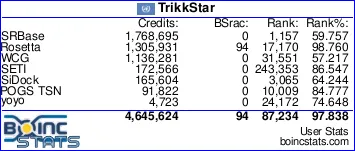
The Einstein@Home research project has recently released three new publications detailing their methods and findings in a low-frequency search of advanced LIGO data. These publications are currently awaiting peer-review and approval for publication in Physical Review D, but are currently downloadable through the arXiv server through Cornell University.
The lead of the three publications is entitled First low-frequency Einstein@Home all-sky search for continuous gravitational waves in Advanced LIGO data and the abstract reads as follows:
We report results of a deep all-sky search for periodic gravitational waves from isolated neutron stars in data from the first Advanced LIGO observing run. This search investigates the low frequency range of Advanced LIGO data, between 20 and 100 Hz, much of which was not explored in initial LIGO. The search was made possible by the computing power provided by the volunteers of the Einstein@Home project. We find no significant signal candidate and set the most stringent upper limits to date on the amplitude of gravitational wave signals from the target population, corresponding to a sensitivity depth of 48.7 [1/Hz−−−√]. At the frequency of best strain sensitivity, near 100 Hz, we set 90% confidence upper limits of 1.8×10−25. At the low end of our frequency range, 20 Hz, we achieve upper limits of 3.9×10−24. At 55 Hz we can exclude sources with ellipticities greater than 10−5 within 100 pc of Earth with fiducial value of the principal moment of inertia of 1038kg m2.
The full text of the publication can be found here; while the supporting papers, An adaptive clustering procedure for continuous gravitational wave searches and A new veto for continuous gravitational wave searches, can be found here and here respectively.
Einstein@Home uses the distributed computing platform BOINC to help analyze the data used in their research by utilizing the compute power of volunteers who run the BOINC client on their PC/Mac/Linux/Android devices. Additionally, Einstein@Home is one of many BOINC projects whose volunteers are eligible to receive Gridcoin for their contributions to furthering science.
Original update from Einstein@Home
------------------------------------------------------------------------------------------------------------------------------------------
If you want to learn how to benefit science while earning crypto, check out the Gridcoin Getting Started Guide.

You can tip me GRC at: RxSNgLKUNNGa4PXb4Cpg2dXyqvRBfvEVt2